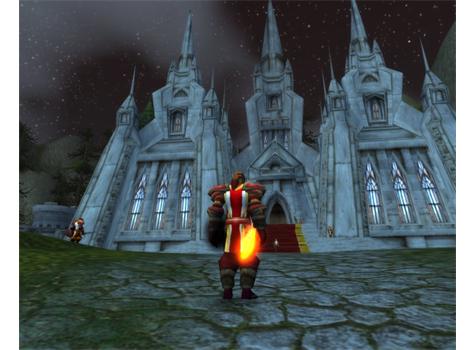First of all, when many people refer to "learning one's class," they mean learning one's class for the purposes of raiding. In PvP situations, most people don't mind as much if they fight with someone who doesn't know their class, and most people are quite happy to fight against someone who doesn't know their class. In raiding, however, if someone doesn't know how to play their class, then everyone suffers. Thus, when I say "learning one's class," will from now on be referring to "being prepared for raids." This also applies for 5-man instances, which are meant to be a stepping stone between solo-ing and raids.
Now, the first thing one needs to know when preparing for raids is where he fits in. I am, of course, referring to the three key roles: tank, DPS, and healer. It is my opinion that the leveling process does not adequately prepare players for any of these roles. For example, when it comes to tanking, one concept frequently lost on new tanks is that tanks always need to hold the attention of the enemies, with rare exception. Let's imagine a warrior solo-ing his way to 80. Since has has only fought for himself, he has no concept of keeping a monster attacking him, even if he is low on health. He may be glad to see that monster run away once it gets low on health. That gives him an opportunity to bandage up or loot another guy he killed. If he has high health, then he will probably be just as glad to see that runner grab an extra guy; it means that the monster and the loot it drops will come to him, rather than him needing to run to it. Of course, everyone who has ever done an instance knows that this kind of attitude towards runners is a guaranteed way to cause a wipe. More adds means more damage means healer heals more means healer runs out of mana means everyone dies.
Now let's say our little lonely warrior is out fighting a gnoll and another one runs past him to attack someone else. He is the same level as the gnolls, and his gear isn't the greatest (he is leveling, after all, and will soon replace it), and thus he can't take on two at once. Thus he lets it attack the other player, and if it comes back to attack him, he runs away. Put that warrior in an instance, and you have a tank who lets adds attack the mage and actually runs for the instance entrance when it all goes wrong, both of which are bad to do. (Note: I did both of these things when I first tanked Deadmines, so I am not making these things up.)
As for DPS, while leveling, more damage=faster kill=better chance of survival. While raiding, more damage=likely out-threat-ing the tank=death, or potential wipe. The leveling process teaches DPS nothing of threat, one of the most basic concepts necessary for a DPS to know for raids. Leveling creates a mindset that more damage is always good, and that moderation of damage is never necessary. Obviously, when raiding, the opposites of both facts are true, yet it seems that many a DPS that I have PUG'ed with have no concept of threat or damage moderation.
Healing is also a difficult concept for solo-ers to grasp. Put a priest who has always had to fend for himself in a group and he'll probably at the very least keep a shadow word: pain up on the boss. Leveling also requires strategies for survival that are not viable in groups. A solo-ing priest will use power word: shield a lot to protect them from damage and allow them to cast spells unimpeded. However, unless a priest is spec'ed deep Discipline and the tank is a high enough level (read: 80) that he doesn't need to depend on taking damage to generate rage/mana (if a paladin), then the shield will be a liability. Solo-ing also frowns upon overhealing, as it wastes mana, which means more downtime. In a group, overhealing is certainly not the ideal, but it's better than a dead tank.
Most importantly---and this can be applied to all players regardless of the roll they play in raids---solo-ing teaches a player to be self-reliant, and the habits of self-reliant players are often detrimental to the success of a raid, where everyone needs to work together. Now, when I refer to self-reliant behavior, I'm not talking about a shaman DPS healing damage he took from an AoE effect if the healer is busy healing the tank. I'm talking about a priest using psychic scream when he is attacked, a druid tank shifting out of bear form to heal himself, a mage using ice armor for its defensive capabilities rather than mage armor for more mana or molten armor for more DPS, a mana-using DPS going OOM because he was using his highest-damage abilities rather than his most mana-efficient ones, a frost mage going into an instance spec'ed for survival and not for damage and putting out sub-par DPS as a result, a hunter using distracting shot to "save" a tank because he does it when his pet is low on health and he can usually take the damage, or an elemental shaman using stoneskin totem in a raid rather than strength of earth totem because he has no use for strength or agility. All of these are mistakes I have seen players make, even in level 80 instances, where players should know better.
 Just like in real life, methods you use to protect yourself in WoW are often counter-productive to the success of the group, impeding others from accomplish their goals. Oh yeah, I just combined WoW, philosophy, and political commentary with one picture and one caption. I'd like my medal now.
Just like in real life, methods you use to protect yourself in WoW are often counter-productive to the success of the group, impeding others from accomplish their goals. Oh yeah, I just combined WoW, philosophy, and political commentary with one picture and one caption. I'd like my medal now."But," you may say, "we all had to go through the leveling process, so why don't we all suck?" First of all, Dr. Dennis Leary would disagree with your assumption. Second of all, players learn the above-mentioned concepts not by leveling, but by doing low-level instances and/or group quests. That's how I learned about tanking, and it's how anyone who wants to learn the basics of grouping gets started. However, anyone who has already reached level 80 and is leveling a second character probably isn't going to want to run a low-level instance, so they won't get any experience with their new class in groups. And since they probably already understand the basics, why would they need to learn anything anyways?
"But," you say, "if someone has been a tank all the time they've been playing WoW, how can they learn another role?" I recently had this experience. For as long as I can remember, I was a tank on my druid. With the advent of dual-specs, I could finally become a healer, a role which I had always wanted to try out but never did for fear of losing my solo-viability. Having never healed an instance before, I read some online guides to druid healing, did the math to figure out my most mana efficient heals, familiarized myself with my new keyboard layout, and started in an instance I was already familiar with---Violet Hold. Not only did I heal really well, but I even got complimented on my healing, and I now heal raids in my guild frequently. Point is, though not all roles are created alike, learning a new role and learning it well has nothing to do with leveling.
"But," you should be saying now, "what about learning the nuances of your class? Put a level 50 shaman in the hands of someone who isn't familiar with the class and they will be overwhelmed." First of all, anyone who is lucky enough to receive a level 50 shaman should get on their knees and thank whichever god, gods, deity, or deities they worship for what they have received (unless they already have one, of course). I will admit, it would probably be overwhelming to learn a class from scratch at level 50. I think that if a "start a new character at 55" system where ever implemented, it would need to be like the Death Knight starting quests. It would grant players their talent points and abilities slowly, allowing players to become acclimated to their class at a comfortable pace. These quest-lines could also be class specific, allowing players to learn the intricacies of their class better. With the news the Cataclysm may completely change Azeroth, such a system may be possible. Imagine starting a new soldier of Stormwind/Orgimmar in a war-torn world where only a few fragments of the old conflicts remain. Since the various leaders need more troops fast, they could use these new recruits to clean up the mess left in Azeroth's old zones while using the experience to help them prepare for the coming battles. I think that quests like that would make for a good story. I'll post next Monday on ideas I have for how such a system could be implemented. (Edit: I never did this, for lack of ideas, and I apologize.) That is, unless Blizzard comes out and says the leaked Cataclysm details were hoaxed and MMO Champion was wrong.
 Would they lie to us? Well, maybe... You can't really blame them if Blizzard was using the alleged leak as a foiler to test the waters with player's reaction to radical changes.
Would they lie to us? Well, maybe... You can't really blame them if Blizzard was using the alleged leak as a foiler to test the waters with player's reaction to radical changes. Coming back to the main point, leveling does a lot of things, but the only thing it does really well is prevent a player from getting to the new content with a new character in a timely manor. Blizzard has already said that they think end-game is where it's at, so why they won't let players get on the fast track there is beyond me.






No comments:
Post a Comment